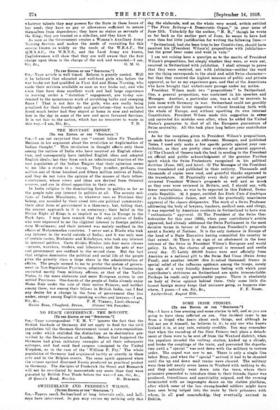THE MONTAGU REPORT.
[To THE EDITOR OF THE " SPECTATOR."] FIR,—I am not surprised that you " cannot follow Sir Theodore Morison in his argument about the revolution or Anglicization of Indian thought." This revolution in thought affects only those among the natives of India who have received an English educa- tion, and consequently have imbibed English ideas and adopted English ideals; but they form such an infinitesimal fraction of the vast population of the Indian Empire that their agitation seems to me like a storm in a teacup. They number, perhaps, one million out of three hundred and fifteen million natives of India, and they do not voice the opinion of the masses of their fellow- eauntrymen, whose views and ideas are derived from Oriental soure.es, and are in direct opposition to their own.
In India religion is the dominating factor in politics so far as the people take any interest in politics at all. The seventy mil- lions of Indian Musalmans, to whatever race or Province they belong, are moulded by their creed into one political community; their ideal form of government is a theocracy, but, failing that, the nearest approach to it is an autocracy; their belief in the Divine Right of Kings is as implicit as it was in Europe in the Dark Ages. I may here remark that the only natives of India who ever expressed to me the slightest interest in foreign politics were Musalmans; and their interest was mainly confined to the affairs of Muhammadan countries. I never met a Hindu who took any interest in the world outside of India; and it was only men of certain castes, Brahmins and Kshabryas, who took any interest in internal politics. Caste divides Hindus into four main classes —priests, warriors, traders, and labourers; and the arts of war and government are confined to the second class. But the fact that religion dominates the political and social life of the people gives the priestly class a large share in the administration of affairs. The people seemed to me to prefer the system of govern- ment in Non-Regulation Provinces, administered by a Comanission recruited mostly from military officers, or that of the Native States, to the more elaborate and more European system in our settled Provinces. One-fourth of the people of India already enjoy Home Rule under the rule of their native Princes; and neither among these, nor among their fellows in British India, can I find any desire for a change in the form of government they live under, eicept among English-speaking scribes and lawyers.—I am,
Monte Rosa, Chag/ord, Devon. (Colonel 74th Punjabis).


























 Previous page
Previous page